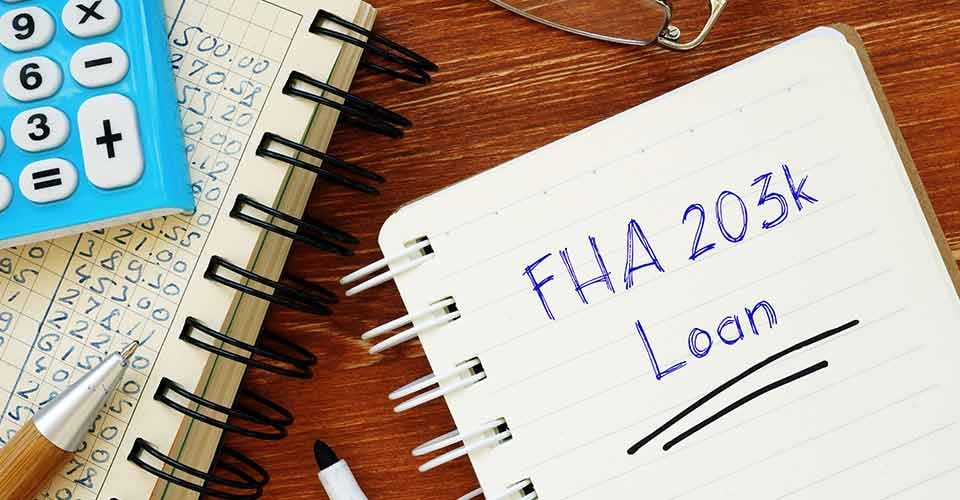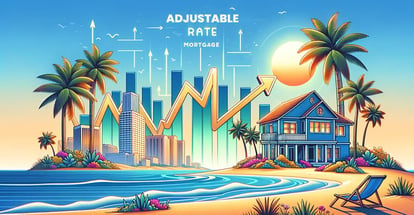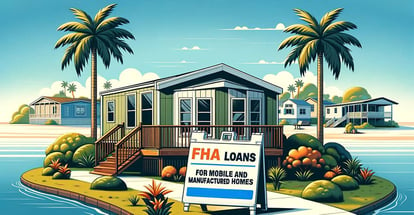FHA 203(k) Loans in Florida: The Complete Guide
This innovative loan option allows individuals to combine the financing for purchasing a home and carrying out renovations into a single mortgage package.
In essence, prospective homebuyers intrigued by the idea of acquiring a fixer-upper that demands extensive repairs and substantial revitalization efforts can leverage the FHA 203(k) loan to encompass the property's cost and the renovation expenses within one consolidated loan.

Moreover, existing homeowners across Florida can seize the benefits of an FHA 203(k) loan to refinance their property and secure funds for their upcoming renovation endeavors through a unified mortgage arrangement.
Let's delve further into the details to uncover how the 203(k) loan can pave the way for you to acquire and enhance your dream home in the Sunshine State.
Table of Contents
- What Is an FHA 203(k) Rehab Loan in Florida?
- How an FHA 203(k) Loan Operates in Florida
- Streamline 203(k) Loan in Florida
- Standard 203(k) Loan in Florida
- What Can an FHA 203(k) Loan Be Utilized for in Florida?
- Qualifying for an FHA 203(k) Loan in Florida
- Refinancing Your Florida Home with an FHA 203(k) Loan
- Pros and Cons of 203(k) Home Rehab Loans in Florida
- Comparing Conventional Home Rehab Financing and FHA 203(k) Loans in Florida
- Is an FHA 203(k) Loan the Right Choice for Your Florida Property?
What Is an FHA 203(k) Rehab Loan in Florida?
What exactly does an FHA 203(k) rehab loan entail?
To put it simply, it's a unique type of home financing or refinancing option that empowers individuals looking to buy or homeowners seeking to enhance their property to merge the expenditures linked to the real estate itself and the upcoming renovation projects into a single mortgage package.
If you come across a property in Florida that captures your interest for purchase or refinance, but it's apparent that substantial repairs and improvements are needed, opting for an FHA 203(k) rehab loan could prove to be a wise decision.
How an FHA 203(k) Loan Operates in Florida
An FHA 203(k) loan, endorsed by the Federal Housing Administration (FHA), serves as a mechanism that allows prospective homebuyers or homeowners in Florida to secure adequate funds for both the acquisition of a property and subsequent repair endeavors.
The funds accessed via an FHA 203(k) loan can be structured as either a fixed-rate mortgage spanning 15 or 30 years, or an adjustable-rate mortgage (ARM).
These funds can be allocated towards covering the costs associated with materials and labor, encompassing various aspects of the renovation process.
Given the government-backed insurance on these mortgages, it's important to highlight that FHA 203(k) loans often present more adaptable qualification criteria and prerequisites compared to conventional home loans.
In essence, the FHA 203(k) loan serves as a viable solution for acquiring or refinancing a residence in Florida that requires substantial attention and enhancement.
The financial outlay linked to these improvements is incorporated into the total loan amount, which can be repaid over the course of several years alongside your regular mortgage installments.
This characteristic renders FHA 203(k) loans a cost-effective avenue for financing a plethora of home improvements, particularly those of a significant scale.
Similar to any mortgage arrangement, eligibility hinges on factors like income, credit history, credit score, debt-to-income ratio, and other pertinent considerations.
Furthermore, it's important to bear in mind that projects covered under an FHA 203(k) loan are expected to commence within 30 days of the closing date, and the designated renovations should be finalized within a maximum timeframe of 6 months.
Streamline 203(k) Loan in Florida
In Florida, the streamline 203(k) loan, often referred to as the limited loan, comes into play when dealing with homes requiring fewer repairs.
This option extends a maximum of $35,000 to potential homebuyers or homeowners aiming to purchase or refinance a property while factoring in renovation expenses.
What sets this apart is the absence of a minimum cost requirement, and the streamlined application process is facilitated by the relatively smaller loan amounts.
It's important to note, however, that substantial structural repairs cannot be encompassed within the funds sought through this loan type.
Standard 203(k) Loan in Florida
Conversely, the standard 203(k) loan, which is commonly chosen for more extensive projects exceeding $35,000 in magnitude, serves as a robust solution.
In Florida, it grants the flexibility to address major structural repairs. Renovations undertaken through this avenue must tally up to a minimum of $5,000.
To ensure the proper execution of the project and renovation process, the involvement of a U.S. Department of Housing and Urban Development (HUD) consultant becomes requisite.
Adhering to specific regulations and guidelines is essential to guarantee compliance with governmental standards.
What Can an FHA 203(k) Loan Be Utilized for in Florida?
The potential applications of funds obtained through an FHA 203(k) loan in Florida are diverse and encompass a range of projects, including but not limited to:
-
Enhancing the visual appeal of a home.
-
Repairing or installing roofing and flooring.
-
Promoting energy efficiency within a home.
-
Addressing health and safety concerns.
-
Augmenting a home's accessibility or practicality.
-
Revamping plumbing and waste systems.
-
Undertaking landscaping and foundational improvements.
-
Rehabilitating or updating gutters and downspouts.
- Implementing changes that modernize or enhance a home's aesthetics.
It's crucial to bear in mind that certain luxuries such as swimming pools, hot tubs, outdoor fireplaces, satellite dishes, or BBQ pits are not considered eligible expenses by the FHA under the parameters of a 203(k) loan.
Generally, any upgrade or enhancement that doesn't tangibly improve the property's functionality or visual appeal might not be covered within the scope of an FHA 203(k) loan.
Furthermore, specific property types, like mixed-use properties combining residential and commercial elements, and co-ops, might be excluded from eligibility.
Thorough research is advised before pursuing an FHA 203(k) loan in Florida.
Qualifying for an FHA 203(k) Loan in Florida
Just like with any personal loan or mortgage, individuals in Florida seeking an FHA 203(k) loan must fulfill specific essential prerequisites to become eligible.
These criteria closely resemble the standard requirements for FHA loans. Some of the key points to consider include:
-
Lenders typically mandate a minimum credit score of 500 for applicants.
-
For individuals with a credit score of 580 or higher, an FHA 203(k) loan necessitates a minimum down payment of 3.5%. Those with a lower credit score may be required to make a down payment of 10%.
-
An important stipulation is that the property in question must serve as the borrower's primary residence to qualify for a 203(k) loan.
- Repairs and renovations must be executed by a contractor rather than the borrowers themselves.
To initiate the process of obtaining an FHA 203(k) loan in Florida, it's essential to collaborate with an FHA-approved lender.
As part of the application procedure, you should anticipate providing documentation that verifies your identity, validates your income and financial obligations, and confirms your credit score.
These steps are pivotal in pursuing an FHA 203(k) loan opportunity.
Refinancing Your Florida Home with an FHA 203(k) Loan
Building upon our previous discussion, it's important to note that FHA 203(k) loans extend beyond the realm of potential homebuyers.
Current property owners in Florida, aiming to restore and enhance real estate assets within their portfolio, can also tap into the benefits of this loan option.
The mechanics of refinancing an existing mortgage into a 203(k) loan share similarities with standard refinancing procedures, yet additional criteria may apply, as previously outlined.
Upon qualification and choosing to proceed with an FHA 203(k) loan, you'll discover that a portion of the borrowed funds will be allocated to pay off the remaining balance on your ongoing mortgage.
The remaining funds will be placed in escrow until the renovation work is concluded, at which point they will be utilized to settle the associated expenses.
Moreover, if you already have an active FHA 203(k) mortgage, you have the option to refinance it under the purview of the FHA streamline program in Florida.
This avenue could potentially lead to securing a reduced interest rate, resulting in more manageable monthly payments.
Pros and Cons of 203(k) Home Rehab Loans in Florida
While FHA 203(k) loans offer significant advantages, it's crucial to consider the corresponding pros and cons before making a decision, whether you're contemplating an FHA 203(k) loan, a conventional mortgage, or a personal loan. Careful research is key.
The benefits and drawbacks encompass the following:
Pros
-
Lower Credit Score and Down Payment Requirements - FHA 203(k) loans often have more lenient credit score and down payment prerequisites.
-
Temporary Housing - These loans can provide options for temporary housing during home repairs.
-
Competitive Interest Rates - FHA 203(k) loans may offer lower interest rates compared to other loan types.
-
Consolidated Financing - You can merge the costs of purchasing a home and renovation expenses into a single loan.
- Low Down Payment and Credit Score Requirements - FHA 203(k) loans maintain relatively low down payment and credit score criteria.
Cons
-
Upfront Mortgage Insurance Premium (MIP) - An initial MIP payment is required.
-
Time-Consuming Application Process - The application procedure may involve substantial time and paperwork.
-
Limited to Primary Residences - FHA 203(k) loans cannot be used for investment properties.
-
Mortgage Insurance Requirement - Ongoing mortgage insurance is obligatory.
- HUD Consultant Involvement - Some projects may necessitate hiring and collaborating with a HUD consultant.
It's important to note that closing costs associated with FHA 203(k) loans align with those of other mortgage and refinancing options.
These expenses encompass typical charges such as appraisals, inspections, lender origination, title search and insurance, credit reporting, property surveys, and more.
However, select lenders might impose additional fees specific to these loan arrangements.
Comparing Conventional Home Rehab Financing and FHA 203(k) Loans in Florida
When it comes to home rehab financing in Florida, conventional loans place a premium on higher credit scores and larger initial payments.
However, these loans also open the door to more lavish renovations and upgrades, surpassing the scope of what the FHA would typically permit.
Despite this flexibility, conventional options often demand stricter application criteria and may carry elevated interest rates.
Prior to making a decision, it's essential to proactively explore various lending possibilities specific to Florida, engaging in thorough rate and term comparisons.
By laying the foundation for your financial choices, you can potentially unlock substantial cost savings in the long run.
Is an FHA 203(k) Loan the Right Choice for Your Florida Property?
In the realm of Florida real estate, FHA 203(k) loans offer a practical avenue for potential homebuyers or current homeowners aiming to acquire a property in need of repair or seeking to refinance and rejuvenate an existing one.
The unique ability to amalgamate expenditures linked to the property's acquisition and subsequent restoration through a singular loan arrangement can yield substantial benefits, particularly for those seeking a gradual repayment approach.
Considering these aspects, if you find yourself contemplating the purchase of a home requiring substantial attention or embarking on renovations for your current property within Florida, an FHA 203(k) loan could align well with your aspirations.
Yet, it's crucial to note that such a loan or refinancing option adheres to explicit prerequisites and regulations set forth by the Federal Housing Administration, potentially placing limitations on certain types of property enhancements and upgrades.
Prior to making a commitment, it's advisable to evaluate your household's specific necessities while comprehending the pros and cons associated with this specific home financing route.
With these considerations at the forefront, whether your objective involves budget-friendly refinancing or revitalizing your Florida residence, an FHA 203(k) loan might present itself as an appealing solution.
Nevertheless, before embarking on the application process, conducting a thorough lender comparison, delving into the intricacies of FHA project guidelines and terms, and discerning the applicability of this financial avenue to your renovation project is prudent.
As part of your decision-making journey, we strongly recommend delving deeper into the diverse array of loan options at your disposal – a treasure trove of possibilities tailored to those eager to finance their imminent home purchase or upgrade within Florida's real estate landscape.
With over 50 years of mortgage industry experience, we are here to help you achieve the American dream of owning a home. We strive to provide the best education before, during, and after you buy a home. Our advice is based on experience with Phil Ganz and Team closing over One billion dollars and helping countless families.

About Author - Phil Ganz
Phil Ganz has over 20+ years of experience in the residential financing space. With over a billion dollars of funded loans, Phil helps homebuyers configure the perfect mortgage plan. Whether it's your first home, a complex multiple-property purchase, or anything in between, Phil has the experience to help you achieve your goals.


 By
By  Edited by
Edited by 






